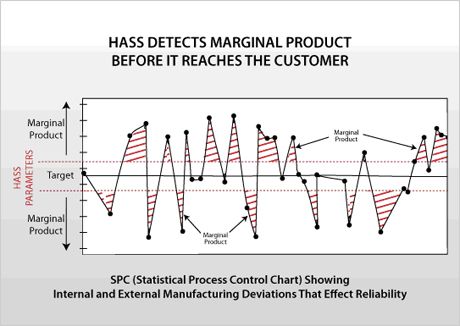Why HASS Works
Early life product failures are often attributable to the inherent variability of manufacturing processes (solder and component changes, etc.). Even a well designed product can suffer high early failure rates where process-induced failures are not found and fixed before the product reaches the customer.
HASS testing (Highly Accelerated Stress Screen) is an accelerated reliability screen that can reveal latent flaws not detected by ESS (Environmental Stress Screening), burn-in and other test methods. HASS testing uses stresses beyond specification, but within the capability of the design as determined by the HALT. The combination of variable thermal and simultaneous vibration stresses, in conjunction with product specific stresses, finds those defects and marginal products that used to show up as “out of box” infant failures, and increased warranty costs. Because the stresses in HASS are more rigorous than those delivered by traditional approaches, HASS testing substantially accelerates early discovery of manufacturing process issues. Reliability engineers can then correct the variations that would otherwise lead to field failures and virtually eliminate shipment of marginal product.
As shown in the SPC (Statistical Process Control Chart) below, internal and external process changes, such as parts substitutions, will affect product reliability. By utilizing HASS testing to detect weak links introduced into the product during the manufacturing process, newfound failure modes can be analyzed, understood and eliminated, restoring process integrity. A much more reliable product reaches customers and far fewer warranty claims result.

 ESPEC North America, Inc. (Corporate office)
ESPEC North America, Inc. (Corporate office)
